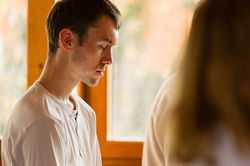
Application form to attend a meditation seclusion in the Ārāma Karunā Sevena
You can find the current offer of courses in the program
Bhāvanā | Meditation Seclusion
Thanks to the generosity of our donors, the ārāma Karuṇā Sevena is able to host lay practitioners who wish to dedicate a period of time to their meditation practice in seclusion.
Meditation seclusion refers to a short or a long term stay in the ārāma, which is dedicated to individual practice, silence, and investigation of Dhamma (natural events happening within and without ourselves).
The time spent in seclusion will be mostly with yourself and your mind. If you are spending it in the ārāma Karuṇā Sevena you may have the chance to meet venerable Bhikkhunī Visuddhi, who will occasionally be available to respond to some questions related to Dhamma and the meditation practice. However, it would be highly beneficial if, during your practice, you will keep the focus on your own mind, avoiding any speaking and external distractions.

The practice of venerable Bhikkhunī Visuddhi focuses mainly on mettā and satipaṭṭhāna meditation. If you have learned Buddhism from a different tradition, or you are familiar with another type of practice, your stay in the ārāma Karuṇā Sevena will be a chance to be introduced to new meditation techniques.
In order to maintain harmony in the Karuṇā Sevena community, we do not strongly advise you to combine different practices, do yoga or other types of exercises during your stay in the ārāma.
While popular meditation retreats require you to follow a strict schedule of either guided or group meditation, Venerable Bhikkhunī Visuddhi focuses on a more individualised approach during the meditation seclusion. This way, each practitioner can freely practice in silence, according to their own needs and inclinations, day and night (except for required daily chores, about 2 hours in the morning).
Ārāma Karuṇā Sevena is a place of contemplation, meditation and training of living in seclusion. It is a space free of hustle and bustle of everyday life. In order to fully benefit from your practice, it is advisable to keep all your electrical appliances turned off during your stay.
Prior to your stay in the ārāma, we kindly ask you to become familiar with the Rules that need to be followed in order to make the best out of your practice, and to maintain mutual respect and harmony in the ārāma.
Spending some quality time in a monastic environment can bring us right back into dedicated practice, and inspire us to strive for our peace of mind. Our human mind is often busy with worries, thoughts, feelings, and images. You may have noticed how sometimes it is challenging to be constantly vigilant, persistent, and motivated in your daily life or during your meditation practice. It is completely ok to feel frustrated, or disappointed about our practice from time to time, but that will not stop us from doing our best. In order to remind ourselves of the teaching of the Buddha, and to dedicate some of our time to meditation, we can seclude ourselves for a few days, either at home or in a monastic dwelling.
Feel free to contact us by email if you have any inquiry in this regard.
Some key instructions:
-
If you are new to the ārāma Karuṇā Sevena, or a beginner in the meditation practice, you will need to attend the first-weekend retreat before being admitted to the meditation seclusion;
-
Prior to meditation seclusion, we strongly advise you to thoroughly read the Rules for lay
practitioners and about the ārāma Karuṇā Sevena; -
During your stay, it is essential to follow the rules heedfully and to respect the eight precepts (attha- sīla). In case of violation the ārāma Karuṇā Sevena maintains the right to terminate your stay;
-
Currently, the ārāma can offer overnight stay for a maximum of 9 people per time;
-
It is forbidden to recite mantras, prayers, and practice other religious ceremonies during your stay;
-
Fasting is not allowed in the ārāma. The body needs a minimum amount of food to practice. We want to make sure that your practice will be beneficial and not detrimental to the body.
-
-
Upon arrival any doubts or confusion which may arise can be clarified in a meeting with Bhikkhunī Visuddhi.

Mental Health
-
If you have been diagnosed with a severe mental health disorder we kindly ask you to directly contact us to discuss the possibilities that the ārama can offer. (karuna.sevena.en@gmail.com)
-
-
Our volunteers are not trained as mental health professionals, thus we advise you to evaluate with your doctor before adventuring in a long term meditation seclusion.
“What taints, bhikkhus, should be abandoned by restraining? Here a bhikkhu, reflecting wisely, abides with the eye faculty, ear faculty, nose faculty, tongue faculty, body faculty and mind faculty restrained. While taints, vexation, and fever might arise in one who abides with the faculties unrestrained, there are no taints, vexation, or fever in one who abides with the
faculties restrained. These are called the taints that should be abandoned by restraining.” MN 2
 |  |
|---|---|
 |  |
